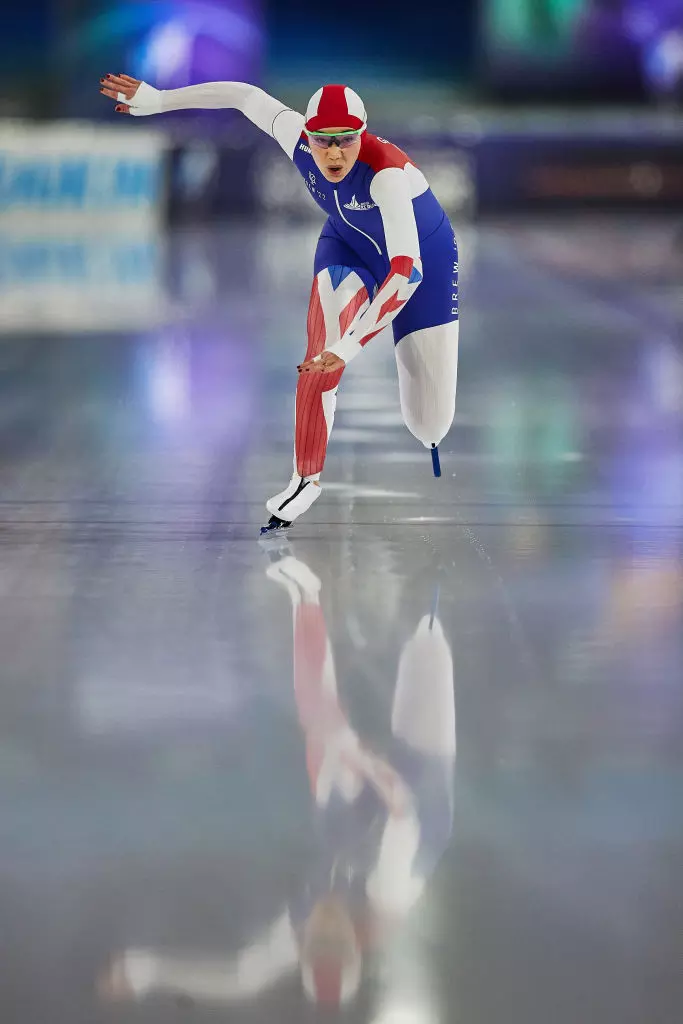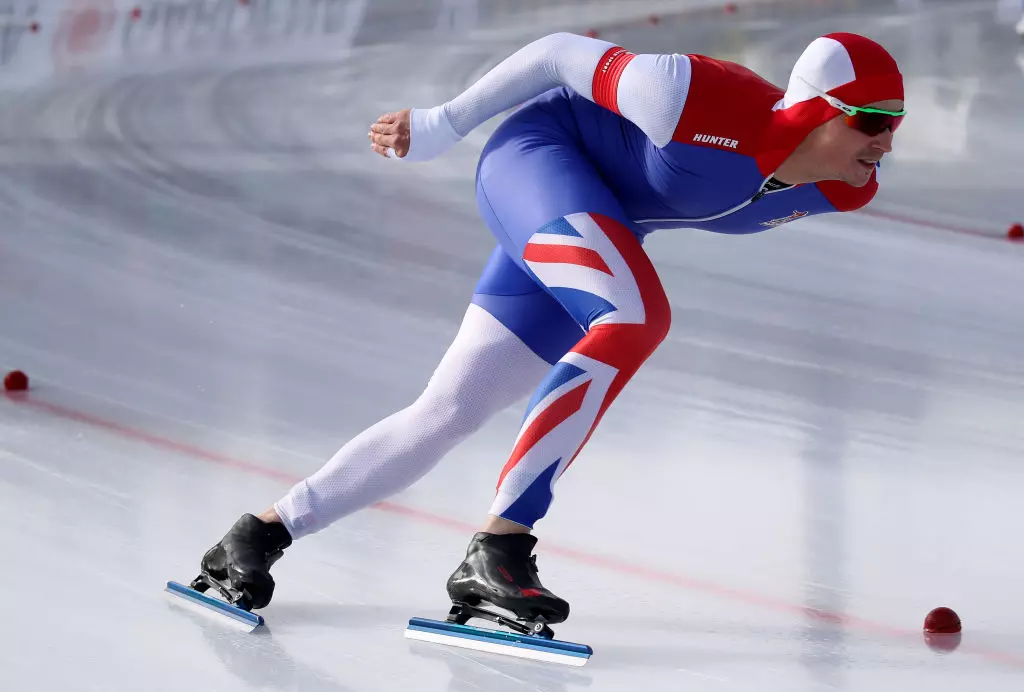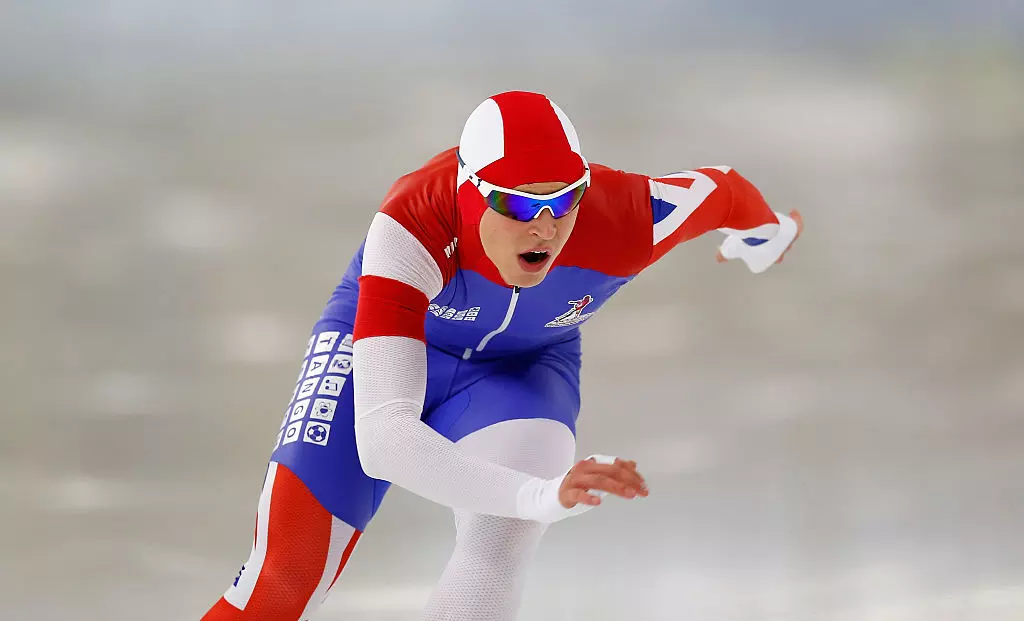Despite significant success in Short Track, long track Speed Skating has long been a forgotten sport in Great Britain. Yet, the nation does have a rich Speed Skating legacy. “The Brits were instrumental in writing the rules for long track Speed Skating,” says Britain’s former racer Stephen Airey, who hopes to see the first British Speed Skater at the Olympic Games since 1992 in Beijing next year.

Ellia Smeding (GBR) © International Skating Union (ISU)
Airey got involved in Speed Skating when he moved with his family to The Hague (NED) for his job 10 years ago, and his son started ice skating. “He loved it and became reasonably good at it, so I started looking around,” Airey says.
1992
“There was very little organized in the UK since 1992, which was the last time a long track Speed Skater represented Great Britain at the Olympics.”
Trying to facilitate his son’s Speed Skating efforts, Airey met more British long track enthusiasts, and together they set out to revive the sport in the United Kingdom and built upon a strong but long-forgotten legacy.

Cornelius Kersten (GBR) © International Skating Union (ISU)
World record
Great Britain enjoyed fairly good results in the 1960s, and Terry Monaghan (GBR) even set a world record in the 10,000m at the Squaw Valley 1960 Olympic Games, only to end up fifth because four others were faster in later pairings.
“It struck me as a real pity that we had been competing in something for a hundred years and that we were not really competing in it anymore”, Airey says.
Off the radar
“After the 1992 Olympic Games, long track kind of dropped off the radar because there’s many Short Track rinks, but nothing for long track.
“We never developed 400m rinks. As the sport evolved the British skaters did not really have the facilities.”
From Short Track to long track
It was thanks to Short Track Speed Skating that long track got back on the British radar again.
“Around 2010 Matthew Lindsay and Phil Brojaka, two very good Short Trackers, picked up long track,” Airey explains.
Although Lindsay and Brojaka never made it to the Olympics due to the tough national qualification marks in the UK, they helped develop long track in their country.
“Phil works as a coach with Dutch trade team Reggeborgh,” Airey says. “From his expertise I started to do introduction courses for Brits who were interested in Speed Skating in Inzell (Germany) some seven years ago.”
The Hague
In the past seven years Airey also had British long track Speed Skaters coming over to The Hague, Netherlands to train on the 400m rink, De Uithof, once a month.
“When we had enough skaters, we also held national championships. We benefitted a lot from the enthusiasm of local skaters in The Hague, who helped out as officials to facilitate the British championships.”
Stephen’s son Samuel Airey and other youngsters including Ellia Smeding and Cornelius Kersten got better and better and started going to Junior World Cups.

Samuel Airey (GBR) © International Skating Union (ISU)
World Cup win
“Ellia even won a Mass Start race in the neo-senior category at the ISU Junior World Cup in Inzell in 2017,” Stephen says. “That was a massive boost because it showed that we could compete.”
Meanwhile, Stephen worked as a manager for the National Ice Skating Association of Great Britain and Northern Ireland – now known as British Ice Skating – trying to arrange all the paperwork.
“The British Olympic Association were extremely supportive,” he says. “They understood where we were coming from and started training us with all the things we had to go through to qualify (for the Olympic Games).”
Contribution from UK Sport
Funding has been one of the major concerns for the British skaters over the past couple of years and Airey is happy to announce a 20,000 euro grant from UK Sport, the country’s government agency responsible for investing in Olympic and Paralympic sport, to help the skaters qualify for the Olympic Games.
“That’s great news,” he says. “We also benefit from the way the ISU finances traveling and hotels for international races, but it doesn’t cover all the costs. Skaters and their families still have to add a lot themselves.”
Smeding and Kersten finance part of their Speed Skating careers with their own coffee company called Brew '22. They both have an elite team to train with too.
Professional training environment
Growing from recreational to an internationally competitive level is a big step, but the next is even harder. Airey says: “When they really want to devote their lives to it, getting them in a professional training environment is extremely difficult.”
Smeding has skated at Team FrySk, in the north of the Netherlands, for five years already and Kersten will be part of Team Worldstream, also based in the Netherlands, next season.
“It’s the perfect team for me. It means more stable training facilities,” Kersten says.
Beijing 2022
None of the British talents managed to qualify for the PyeongChang 2018 Olympic Games, but that could well be different at the 2022 Games in Beijing.
Samuel Airey quit Speed Skating due to an injury setback two years ago, but Kersten, Smeding and Gemma Cooper qualified for the World Cup races.
Stephen Airey looks forward to the new season: “Sam is still involved as an avid supporter and I’m still involved with the team because the skaters are passionate.
“I’ve known them for a long time and I’ve seen them grow form a recreational level to where they are now. I care deeply for these skaters on a personal level and helping them achieve their goals still means everything to me.”